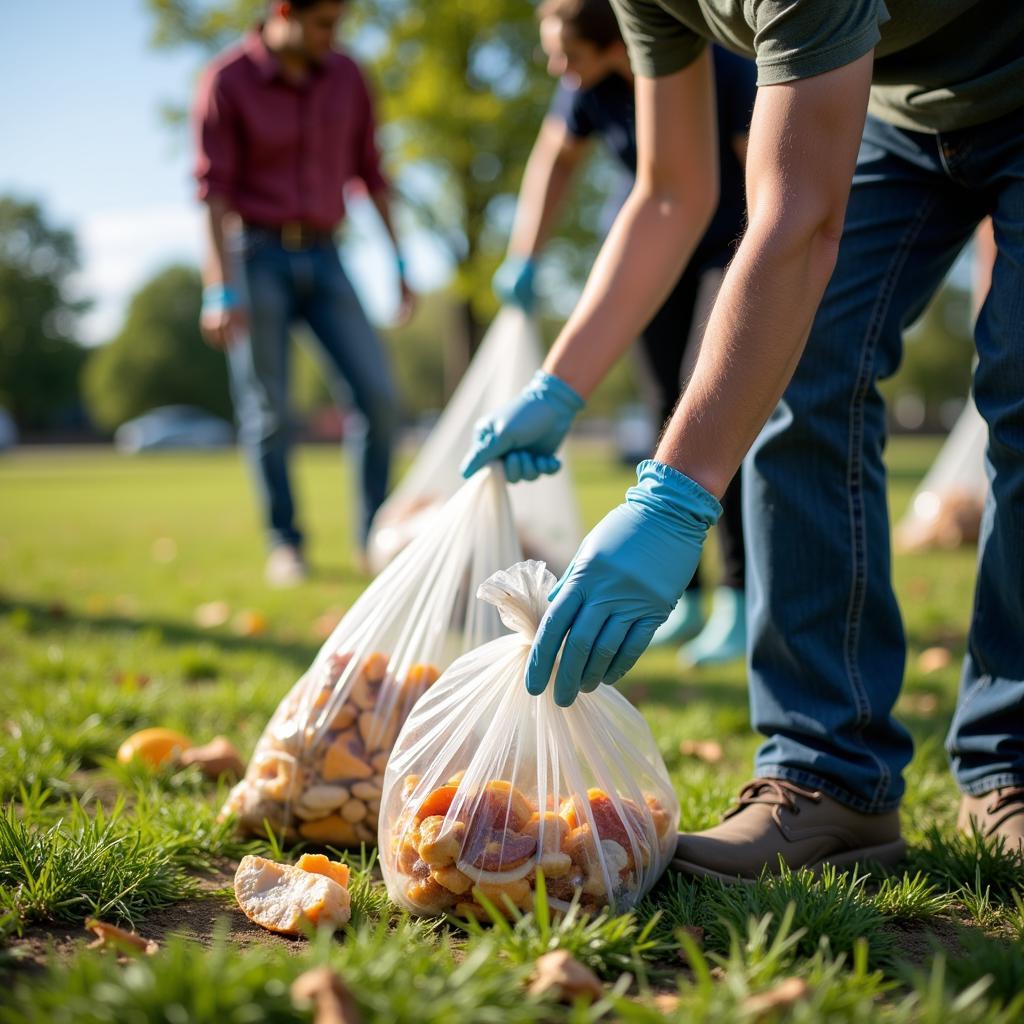Food littering is a surprisingly common issue, often overlooked amidst larger discussions about pollution. While a discarded apple core might seem harmless, the cumulative effect of food waste scattered across our parks, streets, and waterways contributes significantly to environmental problems. We need to understand the real impact of this seemingly small act and how we can all contribute to a cleaner, healthier planet. Let’s delve into the complexities of food littering, exploring its causes, consequences, and potential solutions. You might be surprised at just how much food waste contributes to our overall pollution problem. You can find more information about related topics such as food plastic bags at food plastic bags.
The Hidden Costs of Food Littering
Food littering isn’t just unsightly; it has significant environmental and economic consequences. Decomposing food attracts pests like rodents and insects, which can spread diseases and disrupt ecosystems. Furthermore, rotting food releases methane, a potent greenhouse gas that contributes to climate change. The economic burden falls on local governments and communities, who must allocate resources to clean up littered areas. This money could be used for other vital services.
Why Do People Litter Food?
Several factors contribute to food littering. Lack of awareness about the environmental impact is a key issue. Many people simply don’t realize the harm caused by discarding food scraps. Inconvenience also plays a role. A lack of readily available trash cans or compost bins can make it easier to simply toss food on the ground. Finally, societal norms and peer pressure can influence behavior. If littering is perceived as acceptable within a community, individuals are more likely to engage in it.
How Can We Reduce Food Littering?
Addressing food littering requires a multi-pronged approach. Education campaigns can raise awareness about the issue and its consequences. Increasing the availability of trash cans and compost bins makes proper disposal more convenient. Stricter enforcement of anti-littering laws can deter the behavior. Finally, fostering a sense of community responsibility is crucial. Encouraging individuals to take pride in their surroundings and actively participate in cleanup efforts can make a significant difference.
What are the Health Risks Associated with Food Litter?
Food litter can create unsanitary conditions that pose health risks to humans and animals. Rotting food attracts pests, which can carry diseases. Contaminated food waste can also leach into waterways, polluting water sources and posing a threat to aquatic life. In urban areas, food litter can contribute to air pollution, exacerbating respiratory problems.
Is Food Littering Illegal?
Yes, food littering is often illegal. Many jurisdictions have ordinances prohibiting littering, which includes discarding food waste in public places. Fines and penalties can be imposed on individuals caught littering. The specific laws and regulations vary by location.
What About Composting Food Waste?
Composting is an excellent alternative to discarding food waste. By composting food scraps, we can reduce the amount of organic material sent to landfills and create nutrient-rich soil for gardens and landscaping. Composting can be done at home or through municipal composting programs. If you’re interested in other ways to reduce your environmental impact, you might want to check out our article on swan and duck food swan and duck food.
What are Some Simple Steps to Stop Food Littering?
Start by carrying a reusable bag or container for food scraps. Dispose of food waste properly in designated trash cans or compost bins. If you’re eating outdoors and no bins are available, pack out your trash. Encourage others to do the same. Small actions can make a big difference in reducing food littering. For insights into bringing food into specific natural areas, take a look at our guide on can you bring food into wild rivers.
 Person picking up food litter in a park cleanup
Person picking up food litter in a park cleanup
Conclusion
Is Food Littering a serious problem? Absolutely. While seemingly insignificant, the cumulative effect of discarded food waste contributes to a range of environmental and health issues. By understanding the impact of food littering and taking simple steps to prevent it, we can all play a role in creating a cleaner, healthier planet. Let’s make a conscious effort to dispose of our food waste responsibly and encourage others to do the same. If you’re interested in learning more about sustainable food practices, you can find information about local food suppliers on our page about henderson food and produce.
FAQ
- What are the main environmental impacts of food littering?
- How can schools educate students about responsible food waste disposal?
- What are some innovative solutions for reducing food waste in public spaces?
- How can businesses contribute to minimizing food littering?
- What are the long-term consequences of ignoring food littering?
- How can individuals make a difference in combating food littering?
- What are the best practices for composting food waste at home?
Common Food Littering Scenarios:
- Picnics and outdoor gatherings: Leftover food, packaging, and disposable tableware are often left behind.
- Fast food restaurants and takeaways: Discarded wrappers, containers, and unfinished meals contribute to street litter.
- Sporting events and concerts: Large crowds generate significant amounts of food waste, often improperly disposed of.
- Public transportation: Food and drink containers are frequently left on buses, trains, and subways.
Further Exploration:
Consider researching local composting initiatives in your community. Learn more about the impact of methane gas on climate change. Explore the connection between food waste and food insecurity.
For support, contact us 24/7 at Phone Number: 02437655121, Email: minacones@gmail.com, or visit our address: 3PGH+8R9, ĐT70A, thôn Trung, Bắc Từ Liêm, Hà Nội, Việt Nam.